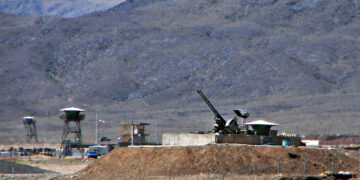April 15, 2025
Trump administration takes the first diplomatic step with Iran over nuclear program

For the first time in about a decade, senior U.S. and Iranian officials met face to face. Last Saturday, Steve Witkoff, the U.S. envoy to the Middle East, and Iranian Foreign Minister Abbas Araghchi held a round of negotiations on a subject that has been a source of contention for the two archnemeses for more than two decades: Tehran’s nuclear program.
The aim? To determine whether enough common ground exists to continue diplomacy toward an agreement that would restrain Iran’s nuclear activities in exchange for U.S. sanctions relief, an arrangement that sounds quite similar to the very deal President Donald Trump withdrew from during his first term.
The talks went as well as anybody could expect. U.S. and Iranian officials are used to talking past each other. This time, they used Oman as a mediator to shuttle positions back and forth. Witkoff and Araghchi had a short meetup at the end of the day, something that wouldn’t have occurred if the two didn’t think there was a basis for moving forward. Both sides made certain that their respective readouts were upbeat. Iran state media said the first round was held in a “constructive atmosphere based on mutual respect.” The White House referred to the discussions as “very positive and constructive.” The second round will reportedly take place in Omar this Saturday.
Washington and Tehran both have reasons for keeping the process on track. The Islamic Republic is at one of its most precarious moments since the Iran-Iraq War in the 1980s. The Iranians are exposed, and they know it. Iran’s decades-long policy of strategic depth, in which Tehran funded, armed and organized proxy militias in countries around Israel, is at death’s door. Hezbollah, once Iran’s most formidable nonstate ally, is still licking its wounds from a devastating war with Israel last year, in which thousands of its fighters were killed, its top leadership was decimated, and its stock of drones and missiles depleted. Hamas is hemmed in within an ever-shrinking part of Gaza as Israeli forces construct new security corridors there and expand their buffer zones. Syria, once Iran’s only state ally in the Middle East, is no longer under its thumb.
More on Middle East

Featuring Rosemary Kelanic
October 16, 2025
Featuring Daniel Davis
October 15, 2025
Events on Iran







